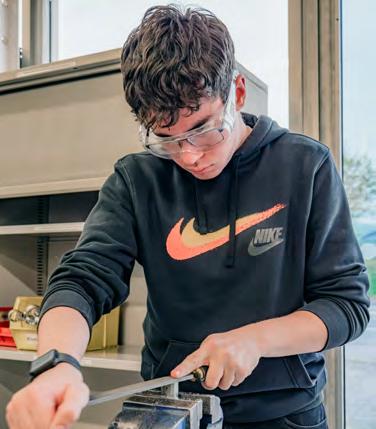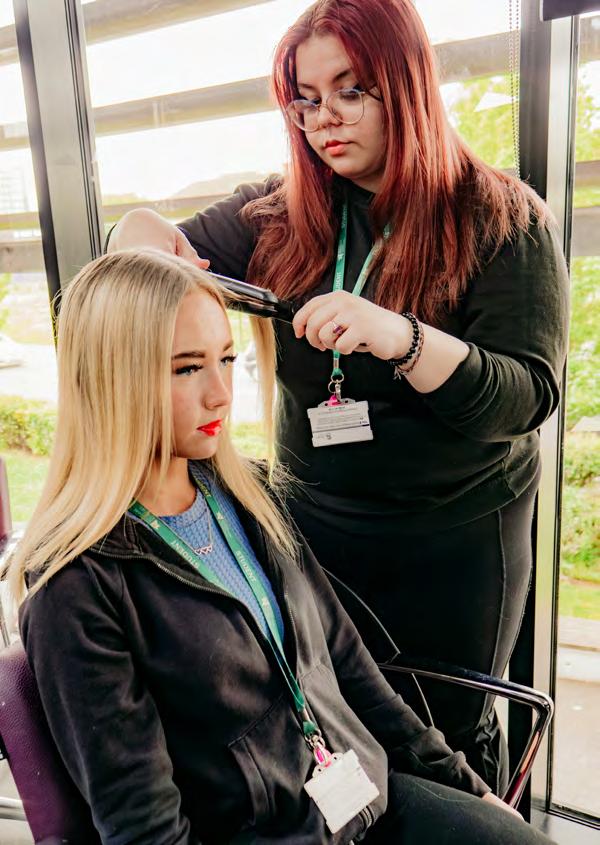













We are proud to work alongside around 750 employers who see value in providing apprenticeship opportunities to over 1,350 apprentices within their businesses.
Our dedicated Business Engagement Account Managers and Apprenticeship Recruitment Specialists will collaborate closely with you, the employer, ensuring you receive support and guidance at every stage of enrolling your apprentice onto their apprenticeship programme.
“The Bedford College Group are incredibly helpful in supporting us with bespoke training and apprenticeships that we require for our business. They also provide an excellent quality of learning that allows our apprentices to expand their knowledge and gain confidence in the roles they cover on site.”
Angela Bryden Tata Steel
We want to ensure you have all the information you need before proceeding - that’s why we are keen to meet with you to walk through the apprenticeship process, answer your questions and explore how it can align to your business needs.
Our Business Engagement team is ready to assist you, as you begin your journey to supporting an apprentice through their apprenticeship!
Levy paying employers will pay 100% of the agreed amount of the apprenticeship standard funding band. This amount will be deducted from your levy via your apprenticeship service account on a payment schedule.
As a non-levy employer the government will pay 100% of the apprenticeship training costs up to the funding band maximum for apprentices aged:
• 16 - 21
• 22 - 24 for apprentices with an Education, Health and Care Plan (EHCP) provided by their local authority or who have been in the care of their local authority.
If your apprentice does not meet this criteria, you will pay just 5% towards the cost of training and the government will contribute the rest, up to the funding band maximum.
All apprenticeship standards are placed into a funding band, within a 30-band funding structure, with the upper limit ranging from £1,500 to £27,000. Skills England provides recommendations to the Department for Education on the appropriate funding band for each standard and it reviews existing standards’ funding bands on a regular basis.
All employers hiring new apprentices are now required to set up an Apprenticeship Service account. You will need to register your details via the link below: accounts.manageapprenticeships. service.gov.uk/service/ index
AGE 16 to 24 Grant (The Apprenticeship Grant for Employers of 16-24 year olds)
£1,000 is available for all employers who hire an apprentice:
• aged 16 to 18 years old
• aged 19 to 24 with an Education, Health and Care Plan (EHCP) or who has been in the care of their local authority
How you’ll get paid:
• The payments will be issued in 2 equal instalments for each apprentice
To be eligible your apprentice must complete:
• 90 days of their apprenticeship for your first payment
• 365 days of their apprenticeship for your second payment
Who will I receive the payment from?
The Bedford College Group (Finance Department) finance@bedford.ac.uk
“The Bedford College Group has gone above and beyond to meet our needs. They have provided tailored training programmes that not only equip our staff with the essential skills and knowledge but also foster a genuine passion for horticulture.”
Gardeners and Designers
Employers can transfer unused funds in their account to any number of other employers, for any number of apprenticeships.
They can transfer up to the annual maximum transfer allowance of 50%. For example, employers could transfer funds to other employers in their supply chains or work with regional, local or sector partners.
Employers can transfer unspent levy funds to other employers through the online pledge function in their apprenticeship service account. Employers can specify the amount of their funds available for transfer. They can also define the criteria of the apprenticeship they wish to support.
This pledge is then advertised on search funding opportunities. This enables other employers, training providers and intermediary bodies to see what opportunities are available. Potential receiving employers will be able to apply for these pledges through their apprenticeship service account.
Alternatively, if an employer already knows who they want to send a transfer to then this can be done through a direct transfer connection.
Receiving employers can use transferred funds to pay for the training and assessment cost (up to the funding band maximum) of their apprenticeship.
For more information on transferring funding, please scan the QR code


Off-the-job training is an essential component and a mandatory requirement of an apprenticeship.
Furthermore, off-the-job training is defined as learning which is undertaken outside of day-to-day work duties and leads towards the achievement of the apprenticeship. This training takes place within the apprentice’s normal (contracted) working hours. The off-the-job training must be directly relevant to the apprenticeship. The minimum off-the-job training for each apprentice will depend on the apprenticeship standard they are enrolled onto. This will be discussed with you prior to commencement of the apprenticeship.
Off-the-job training can be covered by:
College attendance
Working on assignments & revision activities
Work shadowing
Observing skilled workers
Completing job reports
Accessing practical training at work
Learning new tasks
Leading on new projects
Developing portfolio (OneFile)
Construction Trades
Level 2 Bricklayer
Level 2 Carpentry & Joinery
Pathway 1 - Site Carpentry
Level 2 Carpentry & Joinery
Pathway 2 - Architectural Joiner
Level 2 Interior Systems Installer
Pathway 1 - Drylining Systems
Level 2 Fitted Interior Installer
Level 2 Painter and Decorator
Level 2 Property Maintenance
Operative
Level 3 Craft Bricklayer
Level 3 Craft Carpentry and Joinery
Pathway 1 - Advanced Site Carpenter
Level 3 Craft Carpentry and Joinery
Pathway 2 - Advanced Architectural Joiner
Plumbing & Gas
Level 3 Plumbing and Domestic
Heating Technician
bedfordcollegegroup.ac.uk/apprenticeships
Electrical
Level 3 Installation and Maintenance
Electrician
Technical & Professional
Construction
Level 3 Civil Engineering Technician
Level 3 Surveying Technician
Level 4 Civil Engineering Senior Technician
Level 4 Construction Site Supervisor
Level 4 Construction Quantity
Surveying Technician
Level 4 Building Services Engineering
Senior Technician
Engineering
Level 2 Engineering Operative
Level 3 Engineering Fitter
Level 3 Engineering TechnicianMachinist Pathway 9
Level 3 Mechatronics Maintenance Technician
Level 3 Engineering TechnicianProduct Design Pathway 11
Level 3 Engineering and Manufacturing Support Technician
Level 3 Engineering Technician - Toolmaker and Tool and Die Maintenance Technician Pathway 12
Level 3 Machining Technician
Level 4 Engineering Manufacturing Technician
Land-based
Level 2 Countryside Worker
Level 2 Horticulture and Landscape Operative
Level 2 Landscape Construction Operative - Land Route
Motor Sport
Level 2 Engineering Operative (Motor Sport)
Logistics
Level 2 Supply Chain Warehouse Operative
Level 2 Urban Driver
Level 2 Large Goods Vehicle (LGV) Driver
Level 3 Transport and Warehouse Supervisor
Level 5 Operations/Departmental Manager for Logistics
Motor Vehicle
Level 2 Autocare Technician
Level 3 Motor Vehicle Service and Maintenance Technician (Light Vehicle)
Level 3 Vehicle Damage Paint Technician
Level 3 Team Leader/Supervisor
Level 5 Operations/Departmental Manager
Childcare & Teaching
Level 2 Early Years Practitioner
Level 3 Early Years Educator
Level 3 Teaching Assistant
Level 3 Learning and Skills Assessor
Level 4 Assessor/Coach
Level 4 Learning and Skills Mentor
Level 5 Learning and Skills Teacher Hairdressing
Level 2 Hair Professional - Hairdressing
English and maths are an essential part of every apprenticeship and each apprentice will have English and maths skills developed as part of their programme.
For those apprentices who have not already achieved their GCSE Grade 4/C (or other equivalent English/maths qualification) they may need to achieve Functional Skills Level 2 English and maths qualifications, as part of their apprenticeship.
Should apprentices need to complete Functional Skills English and maths, they will be fully supported to complete these by our dedicated Functional Skills staff at The Bedford College Group.
“Working alongside Bedford College for Neville has made such a difference. Their knowledge and support has been invaluable - there is always someone available to answer a question and make you feel at ease. We look forward to our continued working relationship with Bedford College”
Krystal Bailey HR and Social Value Coordinator for the Neville Trust Group

Whether you have an apprentice you would like to enrol or you have an apprenticeship vacancy, we have a dedicated Apprenticeship Recruitment Team who can manage the process for you.
If you are an employer looking to recruit an apprentice, our Apprenticeship Recruitment Team will support you with this. They can advertise, review and send over candidates for you to shortlist and interview. All we will need from you is a job description and some information regarding the vacancy - we can manage the rest.
If you are an employer who has already identified an apprentice / has an existing employee who you would like to enrol onto an apprenticeship, then our Apprenticeship Recruitment Team will complete a pre enrolment process with your apprentice. Your designated Apprenticeship Recruitment Adviser will liaise with you to keep you informed of the progress.
It’s time to enrol your apprentice!
Your apprentice will be contacted and asked to complete an initial assessment (English & maths) and a skills scan to identify their starting point. Your apprentice will also be assigned a designated Training Co-ordinator who will support their apprenticeship journey once they are enrolled, from induction through to completion.
You will be introduced to your apprentice’s Training Co-ordinator at your apprentice’s pre-enrolment meeting. Following this initial meeting, you and your apprentice will be invited into the college for an induction, where all the relevant enrolment paperwork will be concluded.

Please do not hesitate to contact us if there is anything you need to discuss - we are here to guide you and your apprentice every step of the way.
How much do I need to pay my apprentice?
Employers can pay their apprentice(s) as much as they like provided it is not below the National Minimum Wage (NMW) for Apprentices which is £7.55 per hour (effective from 1st April 2025). This applies to 16-18 year old apprentices and those aged 19 and over in the first year of their apprenticeship. If they start working with you before they are enrolled onto their apprenticeship, they should not be paid below National Minimum Wage for their age during this time. Their hourly rate can revert to apprenticeship minimum wage once they have been enrolled.
Do I need to employ my apprentice or can they be self-employed?
The apprentice must have a contract with you, which is long enough for them to complete the apprenticeship successfully (including their apprenticeship assessment). Apprentices cannot be individuals who are self-employed.
Do I need to pay my apprentice when they are at college?
The wage for apprentices applies to both time spent on the job plus time spent training.
Is there an upper age limit for apprenticeships?
No, apprentices can be any age, however the funding varies depending on age.
What is the apprenticeship assessment?
Apprenticeship assessment is the final stage of an apprenticeship. It is an impartial assessment to determine whether your apprentice has developed the skills, knowledge and behaviours outlined in the apprenticeship standard.
Your apprentice has the right to be and feel safe wherever they may be. That could be at home, college, when out in public, but most importantly whilst at work. We have policies and procedures in place to ensure our college and work settings are a comfortable, safe and secure environment. It is important that, if your apprentice feels they are being hurt, bullied or made to do something they don’t want to do, whether in college or outside, they talk to someone. If they are concerned about themselves or someone else within their work setting, they should speak to one of the following people to ensure this is reported:
• Designated Training Co-ordinator
• Their Tutor at College
• The Safeguarding Team at the College
If they have any concerns at all, our staff are trained to support them. They can contact the safeguarding team via email or telephone using the contact details below:
Bedfordshire
01234 291888
safe@bedford.ac.uk
Northamptonshire
Central Bedfordshire
01582 349641
safeguardingcbc@bedford.ac.uk
01536 413004
safe@tresham.ac.uk
If they would prefer to remain anonymous, they can report their concerns via our Report and Support section of the website.
The Bedford College Group welcomes the diversity of our learners. Whether studying on our campuses or in the workplace, all our learners are entitled to develop their skills and knowledge in a supportive environment free from discrimination, victimisation, bullying and harassment. Encouraging equity and preventing discrimination are good for business in many ways:
• Reduces the chance of complaints, disciplinary action or an employment tribunal claim - and avoids the costs and disruption to the company
• Improves team spirit - an employee or groups of employees who are being discriminated against are likely to be unhappy, less productive and demotivated, and this can have a negative impact on all employees
• Reduces the likelihood of staff leaving as a result of discrimination, reducing the costs of recruiting, training and settling in new staff
• Enhances the reputation of the company as a progressive and inclusive employer
• A diverse workforce can bring different ideas and solutions and help a company better understand and meet diverse customer expectations
To encourage equity and prevent discrimination you should:
• Take prompt action to stop harassment or bullying as soon as it is identified. Ensure that offensive comments are not dismissed as banter
• Investigate when complaints are made and keep a record of any action taken
• Use your judgement to correct behaviour that could be considered offensive and remind employees and learners of company policy on these matters. For an example of an Equality and Diversity Policy which an employer can adapt to meet their needs please visit: www.acas.org.uk
• If applicable, be prepared to take reasonable steps to ensure the working environment is accessible to all employees and learners – for example, ensure that toilets, changing facilities and eating areas can be used by everyone
DISCLAIMER: While every effort is made to ensure that the information within this guide is correct at the time of printing, some details may be subject to change. The Bedford College Group reserves the right to make amendments to the study programmes or other details, and to make cancellations or changes if student numbers are insufficient.